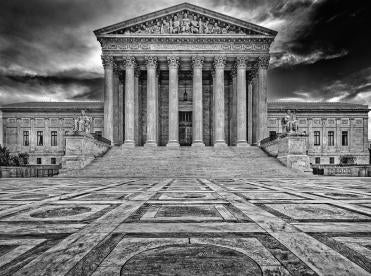The Court’s rejection of the condition of payment analysis and adoption of a rigorous materiality standard represents a significant shift in how courts must analyze FCA cases premised on underlying regulatory or contractual violations.
In Universal Health Services, Inc. v. Escobar, the US Supreme Court addressed a circuit split on the viability and proper scope of the “implied certification” theory of legal falsity under the US False Claims Act (FCA).[1]
The unanimous opinion, written by Justice Thomas, held that the implied false certification theory can be a basis for liability where at least two conditions are satisfied:
first, the claim does not merely request payment, but also makes specific representations about the goods or services provided; and second, the defendant’s failure to disclose noncompliance with material statutory, regulatory, or contractual requirements makes those representations misleading half-truths.
The Court also emphasized the importance of applying a “rigorous” and “demanding” materiality standard. As such, a misrepresentation is not deemed material “merely because the Government designates compliance with a particular statutory, regulatory, or contractual requirement as a condition of payment. Nor is it sufficient for a finding of materiality that the Government would have the option to decline to pay if it knew of the defendant's noncompliance.” Furthermore, not every undisclosed violation of an express condition of payment will create liability. Instead, whether a requirement is a condition of payment is relevant to, but not dispositive of, the materiality inquiry. Proper application of the materiality standard will, in the Court’s view, allow courts to distinguish between true FCA violations and “garden-variety breaches of contract or regulatory violations,” which are not actionable under the FCA. The Supreme Court vacated the First Circuit’s decision and remanded the case for application of this analysis.[2]
The False Claims Act
The FCA prohibits “knowingly” submitting to the Government (or causing the submission of) a “false or fraudulent claim for payment or approval.”[3] Courts have recognized that false claims can be either “factually false” or “legally false.” A factually false claim is one that is based upon inaccurate information about the product or service billed (e.g., a physician bills Medicare for services that were not actually provided). Many courts had held that a legally false claim is one that either impliedly or expressly certifies compliance with conditions of payment set forth in applicable statutes, regulations, or contractual provisions. Some courts had also held that, for the implied certification theory to apply, the underlying rule had to provide expressly by its terms that compliance with it was a condition of payment. It is this implied certification theory that the Court addressed in Escobar.
Procedural Background of Escobar
In Escobar, the relators’ teenage daughter, Yarushka Rivera, was a beneficiary of the Massachusetts Medicaid program and had been receiving mental health treatment at Arbour Counseling Services, a facility owned by defendant. Ms. Rivera died in October 2009 after experiencing an adverse reaction to an anti-seizure medication prescribed by an Arbour employee. Following an investigation, the Massachusetts Department of Public Health found that Arbour had violated a series of Massachusetts regulations in the course of treating Ms. Rivera by failing both to employ staff members with appropriate qualifications, and to provide appropriate medical supervision. Relators alleged in district court that defendant’s claims for payment arising from Ms. Rivera’s treatment were false because defendant knew that it had failed to comply with the Massachusetts regulations relating to licensure and supervision.
The district court granted defendant’s motion to dismiss, reasoning that the regulations that defendant had violated were merely requirements for participation in Massachusetts Medicaid, not “preconditions to payment.”[4] The First Circuit reversed and remanded, holding that the regulations were conditions of payment and that “each time [a defendant] submitted a claim, [it] implicitly communicated that it had conformed to the relevant program requirements, such that it was entitled to payments.”[5]
The Supreme Court granted certiorari on two questions:
-
“Whether the ‘implied certification’ theory of legal falsity under the FCA—applied by the First Circuit below but recently rejected by the Seventh Circuit—is viable”; and
-
“If the ‘implied certification’ theory is viable, whether a Government contractor’s reimbursement claim can be legally ‘false’ under that theory if the provider failed to comply with a statute, regulation, or contractual provision that does not state that it is a condition of payment, as held by the First, Fourth, and D.C. Circuits; or whether liability for a legally ‘false’ reimbursement claim requires that the statute, regulation, or contractual provision expressly state that it is a condition of payment, as held by the Second and Sixth Circuits.”
The Opinion
Leading up to Escobar, federal courts of appeal had divided three ways on the validity of the implied false certification theory of liability:
-
The Seventh Circuit had rejected it altogether, holding that only express falsehoods can be false or fraudulent.
-
Other Circuits had accepted the theory in principal, but limited its application to those instances in which the defendant failed to disclose violations of “expressly designated conditions of payment.”
-
The remaining Circuits had permitted claims even where the requirement that was violated was not expressly designated as a condition of payment.
The Court began by rejecting the Seventh Circuit’s view and holding that, subject to two conditions, “the implied false certification theory can, at least in some circumstances, provide a basis for liability.” The first condition is that “the claim does not merely request payment, but also makes specific representations about the goods or services provided.” For example, Arbour’s use of National Provider Identification numbers that corresponded to specific job titles was more than a bald request for payment; it contained a representation that individuals qualified for those job titles had, in fact, provided the services. The second condition is that “the defendant’s failure to disclose noncompliance with material statutory, regulatory, or contractual requirements makes those representations misleading half-truths.” If, as alleged, the services had been provided by an individual who was not qualified to hold the job title, that would be a “misleading half-truth,” which is actionable under the FCA.
The Court also went on to reject the argument—advanced by the petitioner and adopted by several Circuits—that FCA liability under the implied false certification theory is limited to misrepresentations about compliance with requirements that are expressly designated as conditions of payment. Nevertheless, the Court emphasized that “the False Claims Act is not a means of imposing treble damages and other penalties for insignificant regulatory or contractual violations.”
The Court held that proper application of the materiality standard—which it recognized as “rigorous” and “demanding”—is a key safeguard in separating truly fraudulent claims from regulatory violations and contract breaches. Thus, the Court observed that proof of materiality can include, but is not necessarily limited to, evidence that the defendant knew that “the Government consistently refuses to pay claims in the mine run of cases based on noncompliance with the particular statutory, regulatory, or contractual requirement.” Similarly, “if the Government regularly pays a particular type of claim in full despite actual knowledge that certain requirements were violated, and has signaled no change in position, that is strong evidence that the requirements are not material.” Furthermore, materiality simply does not exist “where noncompliance is minor or insubstantial.”
Notably, there are no “magic words” that render a requirement material. The Government’s labeling of a requirement as a “condition of payment” might be relevant to the necessary factual analysis, but it is not dispositive. Likewise, a requirement that does not bear any such label may, nevertheless, be material based on the facts and circumstances. In light of this analysis, the Court rejected the First Circuit’s holding—which was advanced by the Government at oral argument—“that any statutory, regulatory, or contractual violation is material so long as the defendant knows that the Government would be entitled to refuse payment were it aware of the violation.” According to the Court, the critical factor is not whether the Government could hypothetically refuse to make payment because of a violation, but whether it would in fact refuse to make payment based on that violation.
Using an example raised at oral argument, the Court offered guidance through a hypothetical scenario in which the Government contracts for health services and requires all healthcare providers subject to the contract to buy American-made staplers. Under the Government’s theory, the purchase of foreign-made staplers would render claims for healthcare services submitted by that provider to be FCA violations if the Government could refuse to pay the claim on that basis, “irrespective of whether the Government routinely pays claims despite knowing that foreign staplers were used.” The Court held, however, that such a materiality standard would disregard the necessary factual analysis and render the FCA “extraordinarily expansive.”
The Court also expressly rejected the concern “that materiality is too fact intensive for courts to dismiss False Claims Act cases on a motion to dismiss or at summary judgment.” Instead, because FCA plaintiffs must plead facts supporting their allegation of materiality with “plausibility and particularity,” the Court observed that the lack of materiality continues to be a basis for dismissal. Going forward, then, in order to support liability under a false certification theory, the Government or relator will need to plead specific and particularized facts satisfying the “rigorous” and “demanding” materiality standard.
Conclusion
The Court’s rejection of the condition of payment analysis and adoption of a rigorous materiality standard represents a significant shift in how courts must analyze FCA cases premised on underlying regulatory or contractual violations. Moreover, the Court’s reasoning would appear to apply with equal force to the express false certification of liability theory in addition to the implied false certification theory. Because the majority of significant FCA cases are premised on those theories, this ruling will have a direct impact on both pending litigation and investigations, as well as relators’ and Government counsel’s calculations as to which cases to pursue. At the same time, the Court’s materiality safeguard would appear to inject a true fraud analysis into a statute that had morphed into an onerous regulatory enforcement tool.
[1] For additional analysis of the circuit split, see our December 2015 LawFlash, “US Supreme Court to Decide Fate of FCA’s Implied Certification Theory” and our April 2016 LawFlash, “US Supreme Court Hears Oral Argument on Viability of FCA’s Implied Certification Theory.”
[2] Morgan Lewis represented the Coalition for Government Procurement in filing an amicus brief in this matter.
[3] 31 U.S.C. § 3729, et seq.
[4] United States ex rel. Escobar v. Universal Health Servs., Inc., No. 11-1170-DPW, 2014 WL 1271757, at *1 (D. Mass. March. 26, 2014).
[5] United States ex rel. Escobar v. Universal Health Services, Inc., 780 F.3d 504, 514 n. 14 (1st Cir. 2015).




 i
i

